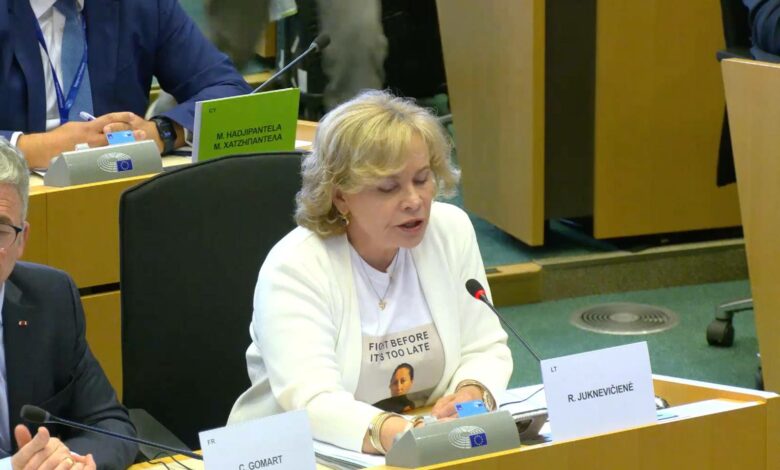
EP’s Foreign Affairs Committee Calls for Targeted Sanctions against Bidzina Ivanishvili
The European Parliament’s Foreign Affairs Committee adopted a report regarding political developments in Georgia in 2023-2024, with 55 votes in favor, 14 against, and four abstentions. The rapporteur of the document is Lithuanian MEP Rasa Juknevičienė, a member of the European People’s Party. The committee approved the report with amendments, but the EP has not yet released its final version.
Presenting the report, MEP Juknevičienė said it is “regrettable” that the document assesses not the progress of the country, but its “huge decline from a democratic state, from a leader of the European partnership countries, to a brutal autocracy.”
“This is an example of how a country can be taken over from within by a pro-Russian government, without firing a shot. The rigged elections, the ruling party’s decision to block the EU, the arrest of journalists and opposition politicians, attacks on the EU and its representatives, these are just some of the facts mentioned in the report,” she said.
EU Path Assessment
The document mentions the recent political developments in Georgia, including the ruling government’s decision on November 28, 2024, to abandon Georgia’s EU path, “disregarding the country’s constitutional commitment to European integration and effectively undermining Georgia’s sovereign Euro-Atlantic aspirations.”
The Committee expresses “deep regret” that the ruling party “failed to use the historic opportunity” to advance EU integration, despite wider public support. “Georgia has not moved forward, and has in fact even regressed” on the key nine steps spelled by the Commission. The report says that the EU integration process has been suspended due to “continued democratic backsliding” and “the adoption of anti-democratic legislation.”
Reiterating “unwavering” support for the Georgian people’s pro-European aspirations, the report condemns “brutal crackdowns” on protests and “violent repression of peaceful protesters, political opponents, and media representatives.” It demands that Georgian authorities “refrain from using force, respect the freedoms of assembly and of expression, and annul the recently adopted draconian legislation aimed at stifling popular protests.” In addition, it calls for the investigation of violent acts.
Necessary Steps
The document calls for a reassessment of the EU’s policy toward Georgia and warns of “the conditional suspension” of economic cooperation and privileges under the EU-Georgia Association Agreement.
The report deplores senior GD officials and government-affiliated media for spreading “manipulative narratives, disinformation and conspiracy theories about the EU and European integration.”
The document “underlines” the role of GD’s founder and honorary chairman, Bidzina Ivanishvili, “in the deterioration of the political process in Georgia by enabling democratic backsliding and by acting against the country’s constitutionally declared interests of Euro-Atlantic integration,” thus calling for “immediate and targeted sanctions” against him, his family members, his companies and his known assets in the EU to be frozen.
Non-Recognition of One-Party Parliament
The Committee says only new parliamentary elections can resolve the “political and constitutional crisis” in Georgia. It notes that the elections should be held in the “next few months” in an “improved electoral environment, overseen by an independent and impartial election administration and monitored through diligent international observation to guarantee a genuinely fair, free and transparent process.”
The document calls GD authorities “self-proclaimed,” does not recognize them, and calls the October 26, 2024, parliamentary elections “rigged.” It says “one-party parliament” is “incompatible” with pluralistic parliamentary democracy.
The document says the policy of non-recognition of the Georgian Dream parliament and President Mikheil Kavelashvili, “appointed” by it, should continue until there is “tangible change” in the country’s course. Calling on the EU and member state representatives to refrain from meetings with what it calls the “representatives of the regime,” it urges continued recognition of Salome Zurabishvili as the “legitimate President of Georgia” and “representative of the Georgian people.”
The report also condemns “continuing and deliberate destruction” efforts to suppress Georgia’s civil society through restrictive laws, intimidation, and physical assaults on activists and journalists. It urges the EU Commission to boost support “without delay” for independent media and NGOs, amid the suspension of the USAID.
The Commission reiterates that the measures taken by the EU so far “do not reflect the severity” of the situation in Georgia. It calls on the EU and member states to introduce personal sanctions against “key political leaders, officials and the regime’s enablers in the administration, business, media, justice system and law enforcement agencies, who are responsible for democratic backsliding, electoral fraud, human rights violations and the persecution of political opponents and activists.”
Alignment on Foreign Policy Matters
The document regrets that Georgia made “no progress” in implementing the EU’s recommendations, while noting that the level of Georgia’s alignment with the EU’s common foreign and security policy remains “remarkably low.”
The Commission is “deeply concerned” with what it claims is the GD government’s “collaboration and rapprochement with Russia” despite the country being occupied. It additionally deplores GD’s “promotion of Russian disinformation and manipulation.”
The Commission notes that the support of EUR 30 million from European Peace Facility was suspended in 2024 “in response to the democratic backsliding in Georgia,” adding “no support in planned for 2025.”
Local Elections
Following the committee vote, the European Parliament released a statement that said the upcoming local elections are “another test of the resilience of Georgia’s democracy and political pluralism.” MEPs called on the opposition parties “to seize this opportunity to reflect the unity of the Georgian people in support of democracy and the rule of law, as already demonstrated by the peaceful protests that followed October’s elections.”
The release quoted Juknevičienė as saying, “The EU and its member states must take strong action before it is too late. We owe it to the brave Georgians fighting for a free and pro-European future.”
“After decades of democratic reforms, MEPs now consider Georgia to be a victim of state capture, repeating their calls for new parliamentary elections in the country,” the release added.
Also Read:
This post is also available in: ქართული